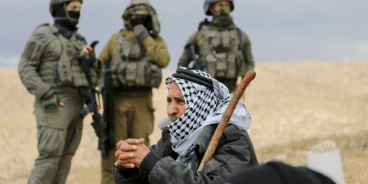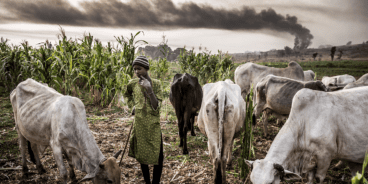
Atrocity Alert No. 75: Children and Armed Conflict, Myanmar (Burma) and Cameroon
Atrocity Alert is a weekly publication by the Global Centre for the Responsibility to Protect highlighting situations where populations are at risk of, or are enduring, mass atrocity crimes.
The “List of Shame”: Children and Armed Conflict
Last Thursday, 5 October, the UN Secretary-General’s annual report on children and armed conflict was presented to the UN Security Council. Many of the grave violations outlined within the report – including the recruitment of child soldiers, targeting of civilian infrastructure, and indiscriminate use of weapons in civilian areas – constitute war crimes and crimes against humanity.
For the first time the report includes the Saudi Arabia-led military coalition in Yemen on its “list of shame,” which names parties that commit grave violations affecting children in armed conflicts. During 2016 the Saudi-led coalition reportedly killed or injured 683 children in Yemen, and targeted at least 28 schools and 10 hospitals in airstrikes.
Nearly all of the countries highlighted in the report are currently experiencing, or are at high risk of, mass atrocity crimes. The recruitment and use of children in Somalia and Syria has more than doubled since 2015. In the Democratic Republic of the Congo the number of child casualties increased last year by 75 percent. In South Sudan responsibility for the majority of cases of sexual violence against children were attributed to government forces. In Afghanistan the UN verified 3,512 child casualties during armed conflict, the highest number ever recorded.
Naming those who violate international humanitarian and human rights law is important, but all those who commit atrocities against children must now be held accountable for their crimes.
Myanmar (Burma)
While the authorities in Myanmar (Burma) have repeatedly claimed that their security operations in Rakhine State have ended, the UN Refugee Agency reported that an estimated 11,000 ethnic Rohingya refugees crossed into Bangladesh on Monday, 9 October. This brings the total number of refugees that have fled Myanmar since operations began on 25 August to nearly 520,000.
Security forces have perpetrated widespread killings, rape and forced displacement, including against women and children, which the UN Committee on the Elimination of Discrimination Against Women and Committee on the Rights of the Child have stated may amount to crimes against humanity. Recent refugees arriving in Bangladesh continue to report that soldiers and local vigilantes in northern Rakhine are still killing Rohingya civilians and burning villages.
Last week, the governments of Bangladesh and Myanmar established a working group to discuss the repatriation of Rohingya refugees. With widespread and systematic violence against Rohingya civilians still ongoing in Rakhine State, such an approach is premature and may violate the principle of non-refoulement.
The UN Security Council must take urgent action to help halt ongoing atrocities in Myanmar, including through imposing an arms embargo and targeted sanctions on senior military officers with command responsibility for forces engaged in ongoing ethnic cleansing. Individual governments and regional organizations should also suspend all aid and training programs with Myanmar’s security forces.
Cameroon
Approximately 30 people have been killed and hundreds wounded after the security forces in Cameroon opened fire on Anglophone protesters who were gathered for a symbolic declaration of independence. According to witnesses and local human rights groups, on 1 October the security forces shot dead protestors from Cameroon’s English-speaking minority who were demonstrating against their ongoing marginalization in the largely French-speaking country.
Unarmed protesters continue to be violently dispersed by the security forces in a number of towns and villages across Northwest and Southwest Cameroon. Following the deadly 1 October protests, the government imposed restrictions on freedom of movement and assembly and shut down access to the internet. The arbitrary arrest and detention of English-speaking protesters also continues.
Tensions regarding the cultural rights of the Anglophone minority, who constitute twenty percent of the population of Cameroon, have been growing over the last year, leading to protests, strikes and the strengthening of secessionist political forces. In response to the Anglophone protest movement, the Cameroon government must ensure that freedom of expression and assembly are respected and that the human rights of all Cameroonians are equally protected.
Any alleged abuses by the security forces – especially the use of disproportionate and deadly force – must be thoroughly investigated and the perpetrators held accountable.
Related Publications


Atrocity Alert No. 445: Sudan, Syria and Eritrea
